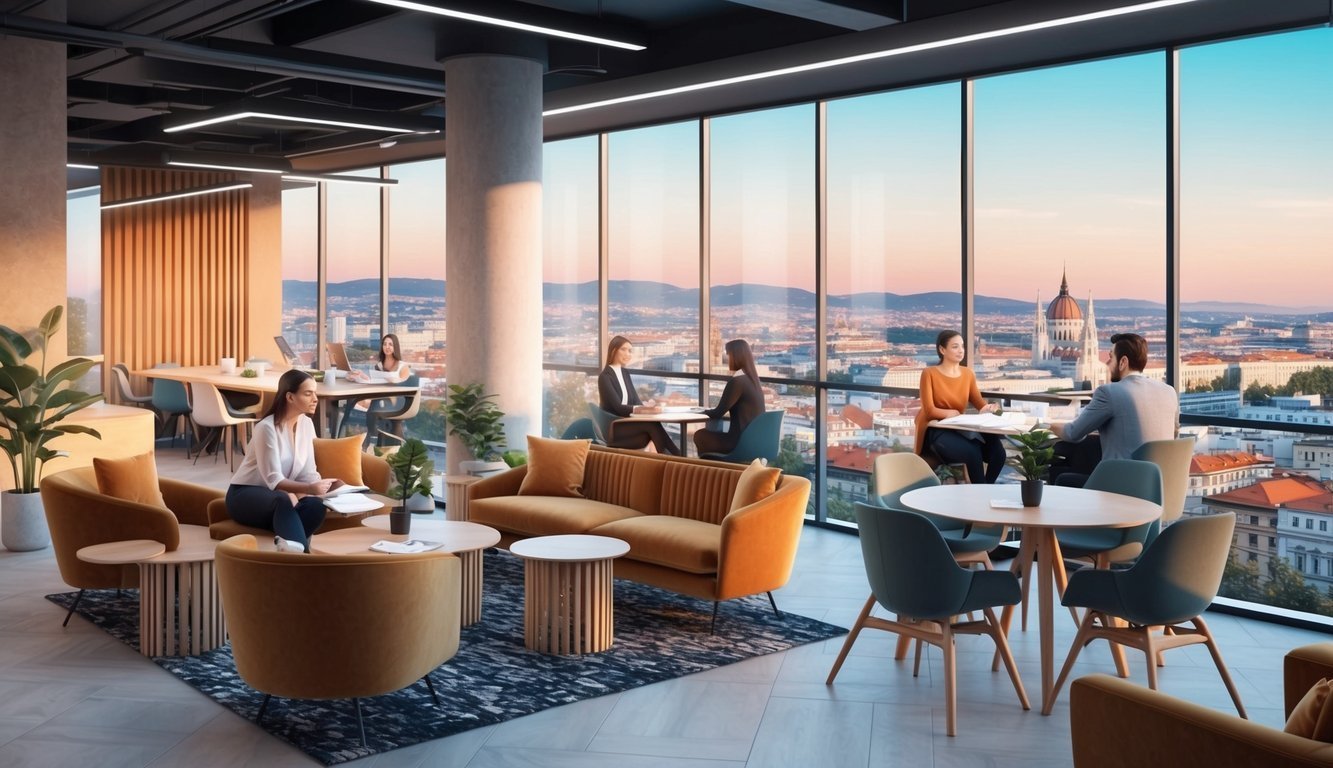Budapest, Hungary, is a vibrant city that offers an exciting lifestyle for digital nomads. Budapest is quickly becoming a top choice for remote workers due to its low cost of living, rich culture, and various coworking spaces. Whether you enjoy exploring historic sites or relaxing in thermal baths, the city has something for everyone.
You’ll find plenty of cafes with good Wi-Fi where you can work while soaking in the local atmosphere.
Navigating Budapest is easy, thanks to an efficient public transport system that connects you to all the major attractions.
While you’re here, don’t miss out on the delicious food scene, affordable groceries, and friendly locals.
From the stunning views along the Danube River to the buzzing nightlife, you’ll have no shortage of activities to keep you entertained when you’re not working.
If you’re thinking about making the move, you’ll find that Budapest not only welcomes you with open arms but also provides a great base to explore Europe.
The combination of great visa options and a supportive community makes it an appealing destination for anyone looking to blend work and adventure.
Key Takeaways
- Budapest offers a low cost of living and robust coworking spaces.
- Efficient public transport makes getting around the city easy.
- A rich local culture and food scene enhance your digital nomad experience.
Understanding Budapest
Budapest is a city full of character, history, and charm.
From its rich past to its vibrant culture, there’s so much to discover.
Here’s what you need to know about this amazing city.
Brief History
Budapest has a fascinating history that dates back to Roman times.
Originally, it was two separate cities, Buda and Pest, divided by the Danube River.
They merged into one city in 1873.
The area has seen significant events, including the Ottoman occupation and the Austro-Hungarian Empire.
The 1956 Revolution marked a crucial point in Hungary’s fight for freedom.
Today, Budapest stands as Hungary’s capital, showcasing its history through stunning architecture and local traditions.
Geographic Overview
Located in Central Europe, Budapest is known for its scenic river views and hilly terrain.
The Danube River runs through the city, offering picturesque panoramas and iconic bridges, like the Chain Bridge.
The city is spread across two hills and flatland.
Buda is the hilly part with historic sites, while Pest is flat and bustling with shops and cafes.
The climate is continental, featuring warm summers and cold winters.
This diverse geography plays a role in the city’s culture and lifestyle.
Cultural Significance
Budapest is a cultural hub with something for everyone.
The city boasts numerous museums, theaters, and festivals that celebrate its heritage.
You can explore places like the Hungarian National Museum or enjoy performances at the Hungarian State Opera House.
The famous thermal baths, such as Széchenyi and Gellért, are a testament to its spa culture.
Additionally, local cuisine, like goulash and chimney cakes, reflects traditional Hungarian flavors.
Engaging with locals can deepen your experience and give you a true feel for Budapest’s vibrant atmosphere.
Setting Up in Budapest
When you arrive in Budapest as a digital nomad, getting settled involves finding the right place to live, spots to work, and connecting with other remote workers.
Here’s what you need to know for a smooth setup.
Accommodation Options
Finding a place to stay in Budapest is easier than you might think.
You have various options, from short-term rentals to longer leases.
Popular platforms like Airbnb and Booking.com offer plenty of choices, so you can find something that fits your budget.
If you’re looking for a more authentic experience, consider local rental websites or Facebook groups.
From historic apartments in the city center to cozy spots near the Danube, you’re bound to find something that makes you feel at home.
Expect to pay around 200,000 – 300,000 HUF (approximately $600 – $900 USD) for a decent apartment.
Finding Workspaces
Budapest boasts numerous co-working spaces that cater to remote workers.
Places like Loffice and Impact Hub offer great amenities, including high-speed internet and comfortable work areas.
Most have flexible membership plans, so you can choose what works best for your needs.
Don’t overlook the city’s cafes.
Many have free Wi-Fi and a friendly vibe, perfect for casual work sessions.
Some popular spots include Caffè Nero and Kiosk.
The cost of coffee is reasonable, usually around 800 – 1,200 HUF (about $2 – $4 USD).
Digital Nomad Communities
Getting involved in the digital nomad community can make your stay more enjoyable.
Check out local meetups and events, which are great for networking and meeting like-minded individuals.
Websites like Meetup.com often list gatherings focused on digital work.
Social media groups can also connect you with fellow nomads.
Join groups on Facebook or follow local Instagram accounts to stay updated on events, workshops, and social gatherings.
This network can help you share tips and even find collaboration opportunities.
Living Essentials
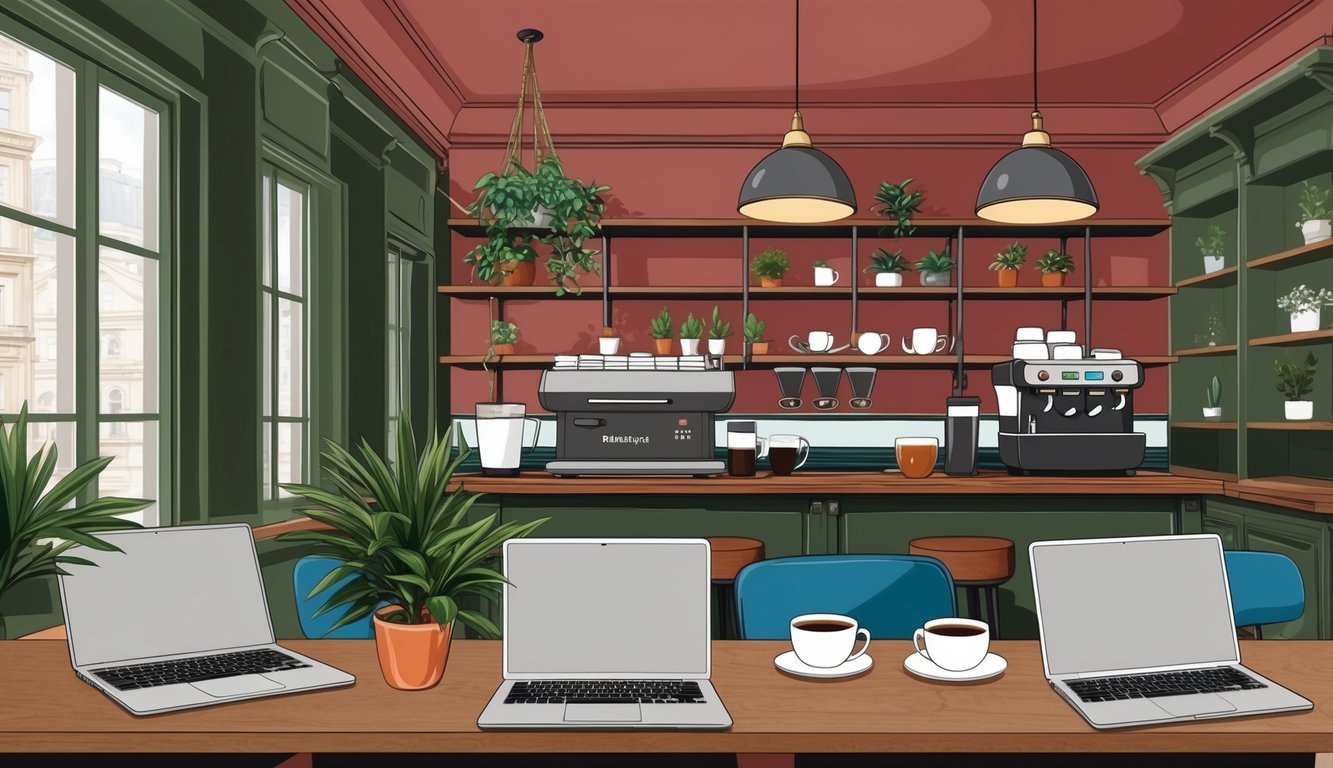
When living in Budapest as a digital nomad, you’ll want to consider the cost of living, healthcare options, and safety measures.
Understanding these essentials will help you settle in comfortably.
Cost of Living Breakdown
Budapest offers a relatively low cost of living compared to other European cities.
On average, you can expect to spend around $761.60 monthly, excluding rent.
Here’s a quick breakdown of some common expenses:
- Groceries: Expect to spend 7000-10,000 HUF (about $22-32 USD) per week on groceries. Cooking at home can save you a lot.
- Dining Out: Eating at a restaurant costs around 1500-3000 HUF (about $5-10 USD) for a meal.
- Transport: Public transport passes are affordable, with a monthly pass costing around 9500 HUF (about $31 USD).
With these figures, you can easily budget your expenses in Budapest.
Healthcare and Insurance
Hungary has a solid healthcare system, but it’s crucial to have health insurance while living here.
Many digital nomads opt for international health insurance that covers their medical needs abroad.
Basic services can be accessed through the public healthcare system, but long wait times may occur.
Private healthcare is available and often preferred for shorter wait times and more convenience.
If you hold a visa or residency, you may need to contribute to the public health fund for coverage.
Review your options carefully to choose the best plan for your needs.
Safety and Security
Budapest is generally safe, making it a great choice for digital nomads.
Violent crime is rare, but petty crime, like pickpocketing, can happen, especially in crowded areas.
Here are some tips to stay secure:
- Keep your belongings secure in crowded places.
- Avoid poorly lit streets at night.
- Be aware of your surroundings, especially in tourist hotspots.
Register with your embassy to receive updates about local safety issues, which can enhance your peace of mind while exploring the city.
Digital Nomad Essentials
Budapest has everything you need to thrive as a digital nomad.
From reliable internet to understanding visa requirements, getting set up in this vibrant city is straightforward.
Here are the key elements to consider.
Connectivity and Wi-Fi Access
When it comes to staying connected, Budapest offers excellent options.
Most cafes, restaurants, and co-working spaces provide free Wi-Fi, which is often quite fast.
For those who prefer working in quieter settings, look for co-working spaces like Kaptar or Loffice, known for their strong Wi-Fi and great atmospheres.
Internet speeds typically range from 50 to 100 Mbps, making it easy to handle video calls, large uploads, and any online work you have.
If you want to use mobile data, consider buying a local SIM card.
Companies like Vodafone and Telenor offer flexible plans perfect for short stays.
Navigating Visa Requirements
Before packing your bags, it’s important to understand the visa landscape.
Hungary offers a Digital Nomad Visa, known as the White Card.
This is a great option if you plan to stay long-term.
You can apply online if you don’t need a visa to enter Hungary.
Just make sure to have proof of income, showing you can support yourself while living there.
Keep in mind that the Schengen Area rules apply, allowing stays of up to 90 days without a visa for many nationalities.
Financial Considerations
Budgeting is crucial when living in Budapest.
The local currency is the Hungarian Forint (HUF), and you’ll find that living expenses here can be quite low compared to other European cities.
Most people spend about 7000 to 10,000 HUF (around $22-32 USD) on weekly groceries, saving you money if you cook at home.
Dining out is affordable too, but cooking is a better choice for long-term stays.
Make sure to set aside some funds for co-working spaces and reliable internet.
Daily Life and Entertainment
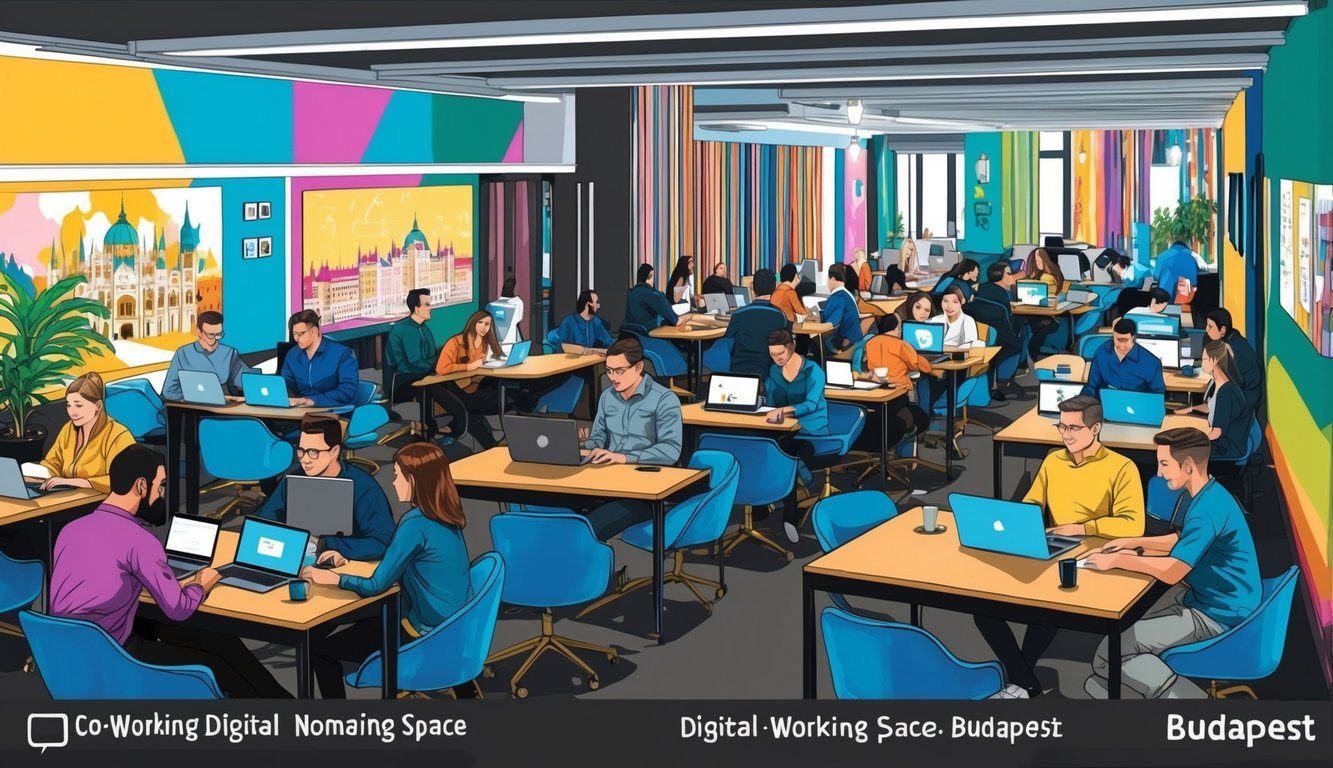
Budapest offers a vibrant lifestyle for digital nomads, mixing delicious food, lively nightlife, and unique relaxation spots.
You’ll find plenty of options for dining, socializing, and unwinding to keep your daily routine exciting.
Food and Dining
In Budapest, the dining scene is diverse, offering something for every taste.
You can enjoy traditional Hungarian dishes like goulash and chimney cake.
If you’re on a budget, street food stalls are a great option, serving up tasty meals at low prices.
Many cafes also cater to those needing a workspace.
For a local favorite, check out a ruin pub for a unique atmosphere blending food, drink, and art.
Grab a coffee at a trendy café while soaking in the city’s culture.
Don’t forget to explore the markets, like the Great Market Hall, where you can sample local products.
Nightlife and Social Scene
After a day of work, Budapest’s nightlife will keep you engaged.
The city is famous for its ruin bars, which are quirky pubs set in abandoned buildings.
Popular spots like Szimpla Kert offer a lively atmosphere and host events like live music.
If you love dancing, many clubs feature electronic music that goes on until dawn.
Art lovers can explore galleries that stay open late or attend cultural events to mix with locals and other travelers.
Meeting fellow nomads in this vibrant nightlife scene can lead to new friendships and connections.
Leisure and Relaxation
Take time to unwind at one of Budapest’s famous thermal baths.
Places like Széchenyi or Gellért Baths provide a unique relaxation experience.
You can soak in soothing waters, enjoy spa treatments, or just lounge in the beautiful surroundings.
For art enthusiasts, the city’s museums offer a great way to spend your free time.
The Hungarian National Gallery and the Museum of Fine Arts showcase impressive collections that inspire creativity.
Parks like Margaret Island also invite you to enjoy a peaceful day outside.
With so much to explore, you’ll always find new hidden gems to discover.
Getting Around Budapest
Budapest offers various ways to help you easily navigate the city.
Whether you prefer public methods or exploring on your own, you’ll find plenty of options to fit your style and budget.
Public Transportation
Getting around Budapest using public transportation is both convenient and affordable.
The city has an extensive network that includes buses, trams, and the metro system.
You can purchase a single ticket for around 350 HUF (about $1.03 USD), or opt for a travel card if you plan to use it frequently.
The metro has four lines connecting key areas, and signs are usually in both Hungarian and English.
Trams are a scenic way to travel along major routes, especially on the famous tram line 2, which runs along the Danube River.
Keep in mind that mobile applications are available for tracking schedules and routes, making it easy to plan your trips.
Cycling and Walking
Budapest has a bike-sharing program called MOL Bubi.
For a small fee, you can rent a bike and explore the city at your own pace.
Many bike lanes exist, especially along the river, making cycling a safe and enjoyable experience.
Walking is another great way to discover Budapest.
The city’s compact layout allows you to reach many attractions easily.
Popular areas like the Buda Castle and the Jewish Quarter are best explored on foot.
Remember to wear comfortable shoes, as you may encounter cobblestone streets and hills.
Car Rentals and Ride-Sharing
Car rentals are available, but parking can be challenging in crowded areas.
Many rental companies operate around the city.
Costs can vary, so it’s wise to shop around for the best deals.
For a hassle-free ride, consider using ride-sharing apps like Bolt or Uber.
They are popular and often cheaper than traditional taxis.
Just ensure you’re connected to mobile internet to book your ride easily.
This way, you can relax and enjoy the sights without the stress of finding parking.
Regional Exploration
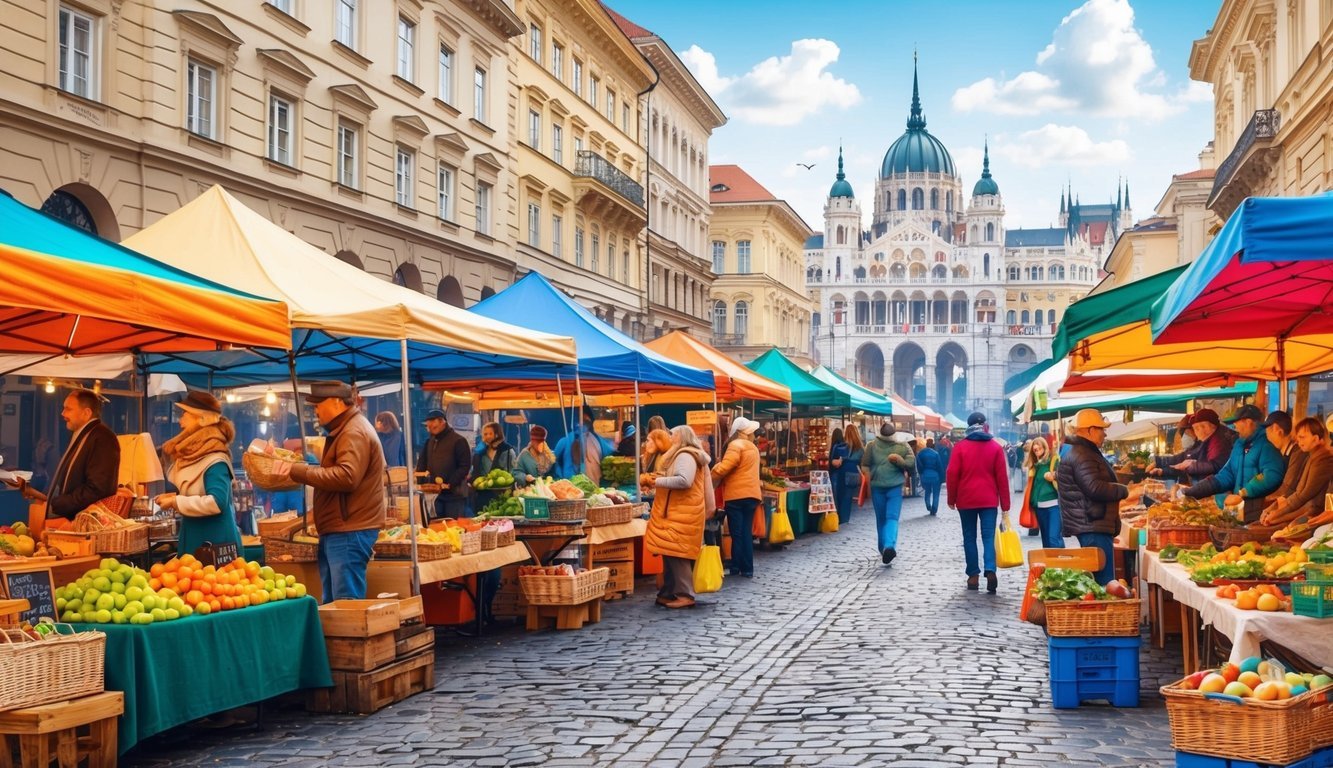
Exploring the regions around Budapest opens up a world of experiences.
Day trips can take you to beautiful cities and towns, each offering its own charm.
Additionally, if you want to visit other cities popular among nomads, you’ll find great options just a train ride away.
Day Trips and Excursions
One popular day trip is to Szentendre, a quaint town just a short train ride from Budapest.
It’s known for its art galleries, museums, and charming streets.
You can stroll along the Danube River, visit the Marzipan Museum, or grab a coffee at a local café.
Another great destination is Visegrád, which is famous for its stunning castle views.
You can hike up to the Citadel for breathtaking panoramas or relax by the Danube Bend.
If you’re looking for nature, Lake Balaton is also nearby.
Enjoy swimming, hiking, or just lounging by the water at this popular getaway.
Other Cities for Nomads
Beyond Budapest, cities like Szeged and Debrecen are worth checking out. Szeged, known for its vibrant cultural scene, features beautiful architecture and a lively student population.
The city has a great café culture and hosts many events throughout the year.
Debrecen offers a mix of history and modern living.
It’s Hungary’s second-largest city and known for the Great Reformed Church.
Students often flock here, making it a lively spot for networking.
With good infrastructure and affordable living, it’s another appealing option for digital nomads.
Maintaining Balance

Finding the right balance between work and personal life is key for digital nomads in Budapest.
Balancing your remote work with social interactions will help you enjoy your stay more and make the most of your time in the city.
Work-life Balance
In Budapest, it’s easy to get wrapped up in work, especially with so many coffee shops and co-working spaces available.
To avoid burnout, set clear boundaries between your work hours and personal time.
Consider creating a daily schedule.
For example:
- Morning: Focus on your most important tasks.
- Afternoon: Take breaks and explore the city.
- Evening: Unwind with friends or local events.
Cooking at home can also save you money and help you eat healthier.
The cost of groceries is low, making it easier to prepare meals rather than dine out constantly.
Community Interaction
Getting involved in the expat community can enrich your experience.
In Budapest, there are many ways to meet people, such as joining local clubs or attending meetups.
Look for:
- Networking events: Great for finding work contacts.
- Cultural gatherings: Connect with locals and learn the language.
- Online groups: Check social media for expat activities and tips.
These interactions can lead to friendships that help you feel more at home.
With the recent visa options for digital nomads, your stay can be longer, allowing you to build deeper connections in the community.
Conclusion
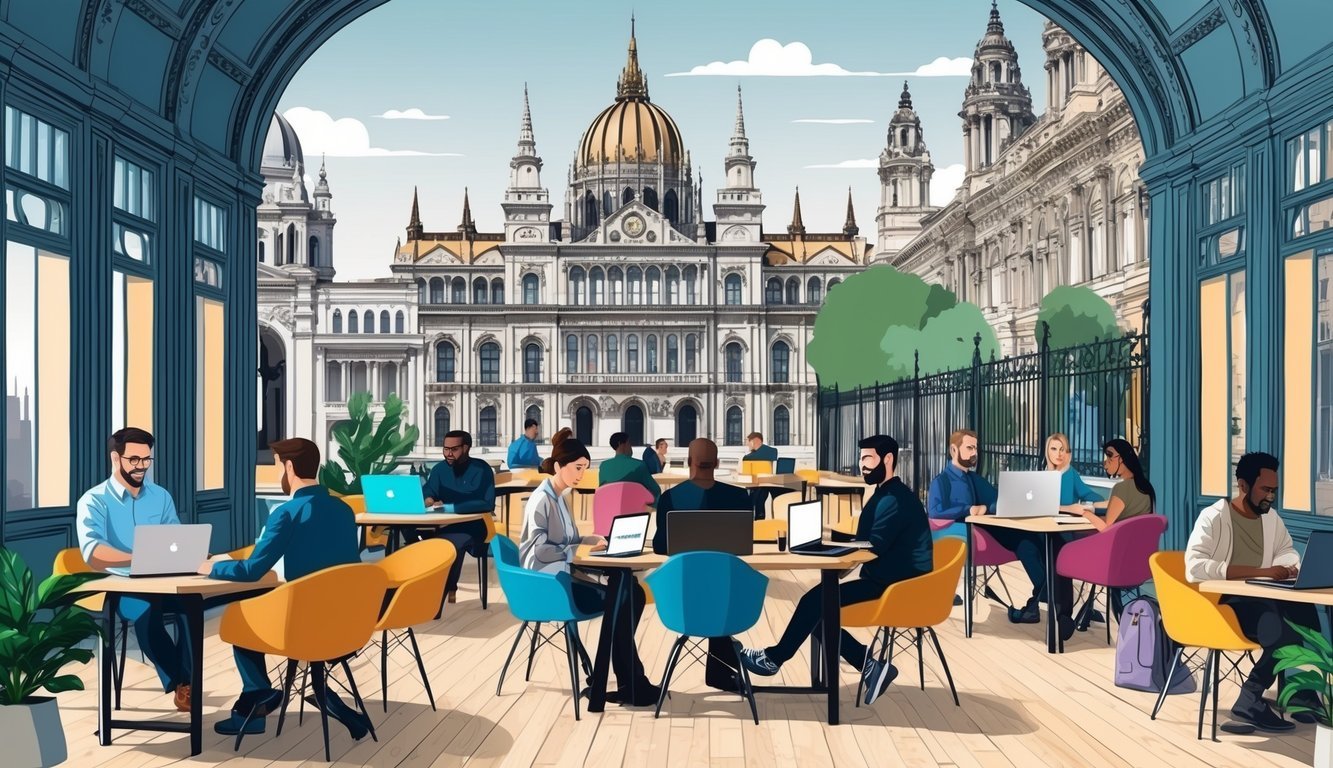
Living in Budapest as a digital nomad can be an exciting journey.
There are many factors to consider, from the cost of living to visa requirements.
Here’s a closer look at what you might expect.
Pros and Cons Review
Pros:
-
Affordable Living: Budapest is known for its low cost of living. You can find meals for less than $3 and groceries are quite cheap.
-
Digital Nomad Visa: Hungary recently introduced a visa for digital nomads. This makes it easier to stay and work in the city legally.
-
Strong Community: There is a growing community of remote workers. You’ll find plenty of coworking spaces and networking opportunities.
Cons:
-
Language Barrier: Many locals speak limited English. This can be challenging in daily interactions.
-
Safety Concerns: While generally safe, it’s important to stay aware. Avoiding isolated areas at night is a good precaution.
-
Proof of Accommodation: You may need to show proof of where you’ll stay when applying for the visa. Make sure to have your accommodation details sorted out.
Frequently Asked Questions
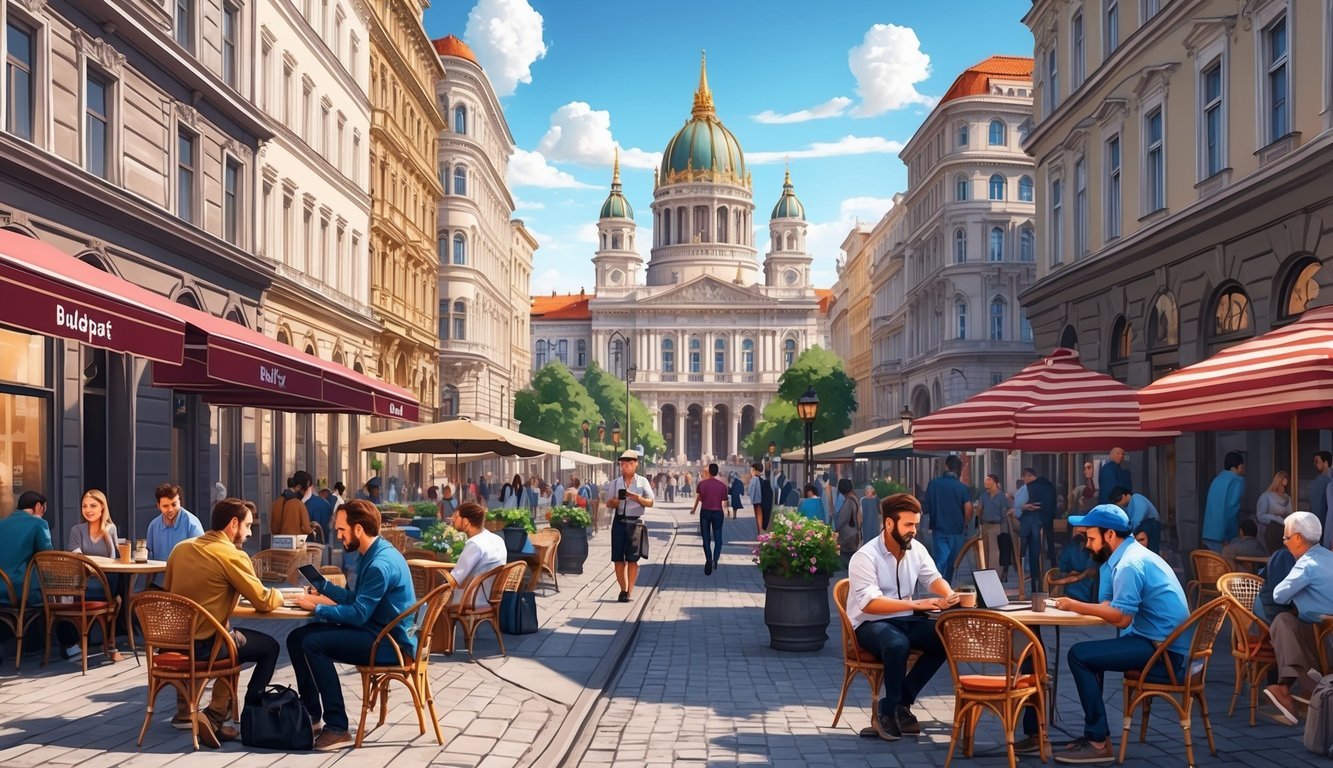
Navigating life as a digital nomad in Budapest comes with its own set of questions.
From cost of living to community vibes, it’s good to know what to expect.
What are the cost of living expenses for digital nomads in Budapest?
Budapest offers a relatively affordable cost of living compared to many Western cities.
You can find decent apartments for around €400-€600 a month.
Daily expenses, including meals and transportation, can be as low as €20-€30.
How do digital nomads in Budapest typically handle taxation?
Tax rules can be a bit tricky.
If you’re a tax resident, you may have to pay taxes on your worldwide income.
However, if you stay less than 183 days, you might only owe taxes on income earned in Hungary.
Are there specific visa requirements for digital nomads wanting to live in Hungary?
Yes, there are specific requirements.
The Hungary Digital Nomad Visa allows you to live and work in the country for up to one year.
You’ll need a valid passport, proof of remote work, and sufficient financial means.
Can I legally work remotely for a foreign company while residing in Budapest?
Yes, you can work for a foreign company.
The digital nomad visa allows you to work remotely as long as your employer is based outside Hungary.
Just make sure to follow any visa guidelines.
What are the top coworking spaces for digital nomads in Budapest?
Budapest boasts some great coworking spaces like Impact Hub and Loffice.
These places offer good amenities and a chance to meet other remote workers.
Wi-Fi is fast, and you can usually find a comfy spot to focus.
What’s the digital nomad community like in Budapest?
The community is vibrant and welcoming.
Many digital nomad groups on social media allow you to meet others and share tips.
You’ll find meetups and events happening regularly, making it easy to connect.

